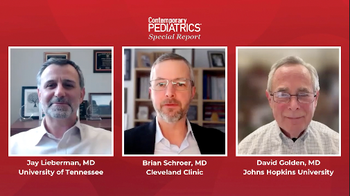Subscribe to Contemporary Pediatrics!
Interested in receiving a copy of the Contemporary Pediatrics journal every month?
Want to stay up to date with pediatric news? Subscribe to the Contemporary Pediatrics e-newsletter to receive emailed updates regarding new data, pediatric clinical trials, puzzler cases, FDA news, and much more.
Thank you for visiting the Contemporary Pediatrics® website. Take a look at some of our top stories from last week (Monday, October 28, to Friday, November 1, 2024), and click on each link to read and watch anything you may have missed.
In this review article, we highlight a discussion with Rakesh Jain, MD, MPH, regarding once-daily clonidine hydrochloride (ONYDA XR) for ADHD. We also highlight GLP-1 treatment for obesity and the associated lower suicidal ideation risk among adolescents with obesity, plus details on a recent recall of certain baby powder.
Scroll below for more.
In a public service announcement, the FDA is sharing Dynarex Corporation's expanded recall of Dynacare Baby Powder, 4 oz and 14 oz because they have the potential to be contaminated with asbestos.
Dynarex stated that the products were sent to distributors via direct deliver after January 18, 2024, to 35 states and Amazon.com. The states include: AL, AR, AZ, CA, CO, DE, FL, GA, IA, IL, IN, KY, LA, MA, MD, MN, MO, MS, MT, NC, NE, NJ, NM, NY, OH, OK, OR, PA, TN, TX, UT, VA, VT, WA, WI.
Click here for full recall details.
The FDA has approved the plasma-protein-based fibrin sealant (FS) (VISTASEAL; Grifols) to control surgical bleeding in pediatric patients, according to a press release from Grifols.
The single-use product can assist with mild-to-moderate bleeding control when standard surgical techniques (suture or cautery) are ineffective. The sealant is applied in a thin layer over bleeding tissue to generate a cross-linked fibrin clot to achieve hemostasis.
In both treatment arms, a more than 95% efficacy rate was achieved, with hemostasis within 4 minutes of application. FS "demonstrated a good safety and tolerability profile, as the distribution of adverse events was comparable between arms," Grifols published in a statement.
Click here for full FDA approval details.
A recently-published, retrospective study suggested that nirsevimab (Beyfortus; Sanofi and AstraZeneca) and Pfizer's maternal vaccine Abrysvo for the prevention of respiratory syncytial virus (RSV) may be associated with a decrease in pediatric ICU utilization.
"We conducted a retrospective analysis of a national multicenter database to determine the proportion of pediatric ICU encounters with RSV infection and the proportion of ICU encounters with RSV infection eligible for RSV prevention," wrote Shanklin and colleagues. "We also explored the differences in clinical variables and markers of illness severity between these groups."
Click here for full study details and results, as well as comments from Octavio Ramilo, MD, chair, Department of Infectious Diseases, St. Jude Children's Research Hospital, Memphis, Tennessee.
In a recent study, treatment with glucagon-like peptide 1 receptor agonists (GLP-1s) in adolescents with obesity resulted in a 33% lower risk of suicidal ideation or attempts at up to a 3-year follow-up, compared to those who initiated behavioral interventions.
In the United States, liraglutide 3 mg and semaglutide 2.4 mg are approved by the FDA to treat obesity in adolescents with a BMI greater than the 95th percentile for age and sex.
"The neuropsychiatric outcomes associated with GLP1R are not well established, and, to our knowledge, have not been examined exclusively in adolescents," stated the authors. "In this study we conducted a propensity score–matched analysis using a multi-institutional federated health care network to assess the risk for suicidal ideation or attempts following exposure to GLP1R in adolescents with obesity."
Click here for full study details and results.
Rakesh Jain, MD, MPH discusses once-daily clonidine hydrochloride (ONYDA XR) for ADHD




